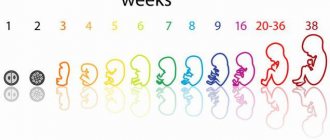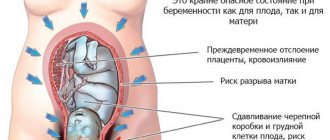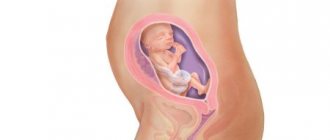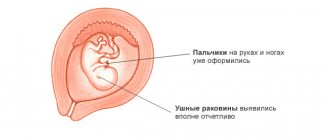The 15th week of pregnancy is the time when the expectant mother’s well-being returns to normal and her appetite awakens. Now I want to eat for two. However, you should not allow yourself to eat too much, and it is also important to ensure that the food is not only satisfying, but also healthy. The tummy becomes more and more rounded and becomes noticeable. Now it is difficult to hide it under clothes.
At the same time, week 15 is just the beginning of the journey; there are still many exciting moments ahead, some pleasant and some not so pleasant. The baby still needs to grow up and get stronger before it is born.
What happens to the mother at 15 weeks of pregnancy?
With the beginning of the 14-15th week of pregnancy, the baby increasingly needs the nutrients it receives from the mother. Therefore, it is often during this period that pregnant women notice increased brittleness of nails, dry skin, dulling of hair and increased hair loss. All these are signals from the expectant mother’s body, indicating that there is not enough calcium in her diet.
The daily menu of a pregnant woman must necessarily contain fermented milk products, especially cottage cheese. In this case, you need to eat natural cottage cheese, and not curd mass or cheesecakes. It is also important to drink at least 2 liters of clean drinking water every day.
The uterus continues to increase in size. At 14-15 weeks it completely passes into the abdominal cavity. Now it does not put pressure on the bladder, and the woman can forget about the frequent urge to go to the toilet for a while. However, it continues to put pressure on the intestines, so one of the most striking symptoms of pregnancy at this stage can be constipation, diarrhea, and digestive disorders. You can avoid such problems by taking care of a proper diet and a balanced diet, which must include fresh vegetables and fruits.
At 15-16 weeks of pregnancy, unpleasant sensations such as weakness and dizziness may appear. These symptoms are caused by iron deficiency in the expectant mother. Blood volume has increased and the body needs much more iron. Its content can only be determined by the results of a blood test, which will have to be taken monthly. If iron levels are low, medications are prescribed that can increase its concentration. There is no need to completely rely on medications, vitamin and mineral complexes; it is better if nutrients enter the body of the mother and child naturally - through food.
The daily requirement of iron for pregnant women is 30 mg. Meat, seafood, eggs, nuts, dried fruits, vegetables, legumes and fruits (pomegranate, apple, persimmon) are rich in iron.
An increase in the amount of blood can cause nosebleeds. This is considered the norm. However, if your nose bleeds quite often, it is better to consult a doctor about this problem.
At 15 weeks the breasts become larger and the nipples usually darken. There is a need to replace the usual underwear and clothes with a larger size.
Belly at 15 weeks of pregnancy
Useful tips
What should you eat and what should you avoid during this period, or better yet, throughout your pregnancy?
- Try as little as possible, or better yet, completely eliminate sugar, white flour and yeast products from your diet. They lead to the development of dysbiosis. Sugar and white flour impair the elasticity of ligaments. It also provokes unnecessary weight gain at 15 weeks of pregnancy;
- Eliminate white rice and semolina - they strengthen the intestines;
- Eat more fruits and vegetables, and foods high in fiber. Switch to whole grain flour, more cereals;
- Drink natural juices and fruit drinks made with berries. Use honey instead of sugar. They saturate the body with vitamins and improve immunity. It is very important if pregnancy takes place during the cold season;
- Well saturates herbal teas, fireweed or currant leaves with vitamins and microelements. But not all herbs can be taken during pregnancy;
- Try to drink at least 2 liters of warm, clean water before 19:00. Afterwards you should abstain so that your kidneys can rest at night.
Amniotic fluid changes frequently, every 3 hours. They are absorbed into the pregnant woman's body. To cleanse and replenish them, you need a lot of liquid. Amniotic fluid is salty, like sea water, and if it is not removed, it can cause edema.
Useful activities at this stage of pregnancy:
- Spend time in the fresh air more often, walk whenever possible;
- Visit the pool if there are no contraindications;
- You can go to the bathhouse. The sauna must be wood-fired and with a humidity of at least 60%. Dry saunas are strictly contraindicated;
- Dance, sing, draw, listen to music. All this has a beneficial effect on the well-being and development of the child;
- Attend a yoga class or other classes for pregnant women, the main thing is that you enjoy it and without putting stress on your stomach at 15 weeks of pregnancy;
- Meditating and listening to yourself will help in the future during childbirth.
Baby at 15 weeks of pregnancy. Fetal development
The baby's legs are growing more actively than in the first trimester. Now they are already longer than their arms. The baby's body proportions are becoming more correct every day. The eyes are now closer to each other, and the ears are already fully formed, which means the baby hears sounds and voices. Small hairs gradually appear on the child's body.
At week 15, the baby’s sweat glands begin to function properly. The pituitary gland also begins to function. The fruit continues to actively develop and improve. His skin gradually takes on a lighter shade and becomes less transparent.
The baby moves much more dynamically. The mother may still not feel his movements at all, this is not scary; by the 18th week the baby will certainly make itself known with the first tremors.
The size of the fetus at week 15 is about 11-14 cm, weight is about 60-70 grams. Gender differences appear, which can already be seen by a specialist on ultrasound. It is from the 15th week of pregnancy that it becomes possible to find out the sex of the child.
15 weeks of pregnancy: information for expectant mothers
The 15th week of pregnancy means that the second trimester has already begun. In expectant mothers, you can notice a small tummy and rounded shapes. How does this period go for a woman? How does the baby develop? Answers to pressing questions are in the article.
pexels.com
Attention! The material is for informational purposes only. You should not resort to the treatment methods described herein without first consulting your doctor.
15th week of pregnancy: sensations
The fifteenth week of pregnancy usually brings long-awaited peace to women. Many have already become acquainted with toxicosis and have successfully said goodbye to it. Also, the uterus moved up a little, which means there was no need to go to the toilet often. And the pregnant woman calms down a little and is not so irritated over trifles.
What is significant about the 15th week of pregnancy? It is at this time that many women first feel the baby’s movements. True, at first they can be confused with increased intestinal motility. Many people say that a child's movements are similar to the swimming of a fish.
If you don’t feel anything, don’t worry: pregnant women, especially those for whom this is the first time, do not notice the baby’s movements until the 20th week.
Let us tell you what sensations haunt the expectant mother at 15 weeks of pregnancy:
Pregnant women may still experience increased fatigue, drowsiness, and loss of strength. If you suffer from this symptom, try to get more rest and not overexert yourself over trifles.
Although nausea and vomiting usually go away by the 15th week, many people continue to suffer from them. Sensitivity to odors may also persist.
- Pain in the lower abdomen and pelvis.
Even at 15 weeks, expectant mothers sometimes encounter unpleasant sensations. Are they short-term in nature and do not cause much trouble? Most likely, the pain is associated with increased growth of the uterus.
This symptom usually appears later in pregnancy. However, even in the second trimester, mothers often suffer from discomfort in the calves. This is due to overexertion, sudden weight gain or lack of calcium and magnesium.
pexels.com
Many pregnant women are surprised to notice that age spots have appeared on their face or hands. This happens under the influence of hormones. Also, women may develop a dark stripe that divides the stomach in half.
Despite the short period of pregnancy, the breasts are already preparing for lactation. Therefore, some pregnant women produce colostrum. The areolas darken and the nipples become more prominent and sensitive.
The listed symptoms are absolutely normal for 15 weeks of pregnancy. Although the acute threat of miscarriage has already passed, the risks still remain. Therefore, consult your doctor immediately if you find:
- The discharge is yellow or green, with an unpleasant odor and a cheesy structure.
- Any bleeding.
- Severe pain in the lower abdomen.
- Pain when urinating.
- Severe malaise.
The 14th–15th week of pregnancy is usually a happy period for the mother. All the ailments have subsided, but the stomach has not yet grown. So enjoy every minute of this time.
15th week of pregnancy: fetal development
At the 15th week of pregnancy, the baby's size can be compared to an orange. The child weighs only 50 g and is about 10–12 cm tall. However, he already has arms and legs, and facial features are forming.
At this stage, many ultrasound doctors can already name the sex of the baby. This information has not yet been verified, but most experts accurately determine belonging to one gender or another.
The baby is actively developing at 15 weeks. Find out what changes are happening to your baby:
- The digestive and genitourinary systems are actively developing.
At the 15th week of pregnancy, according to obstetric signs, the child’s genitourinary system is already functioning. The baby defecates several times a day and drinks fluid that it receives from the amniotic fluid. Don't worry: the liquid is constantly renewed, so the child does not harm his health.
Also, the baby has already formed a gall bladder, which secretes fluid into the intestines.
pexels.com
- The brain is developing.
So far, the baby’s brain has not taken its final shape. The child does not yet have convolutions, but their rudiments are forming. Nerve cells are actively multiplying, which will soon be able to control the baby’s actions.
- The musculoskeletal system is being formed.
At week 15, the baby already has skeletal rudiments that are actively growing. Also, the formation of all milk teeth appeared. Therefore, the baby needs a lot of calcium.
- Baby's skills develop.
During this period, the child begins to actively move his arms and legs, roll over, and somersault. He is still very small, so there is enough space in the uterus to move around.
The baby's sucking reflex is actively developing: he can already put a finger in his mouth and taste it for a long time.
Also at this age the child hears well. Therefore, the mother needs to talk a lot with the baby, and also let him listen to music.
- The endocrine system is active.
The period of the 15th obstetric week of pregnancy is characterized by the production of hormones. The formation of the baby's genital organs is completed. Boys also begin to produce their main hormone, testosterone.
pexels.com
The baby develops hair and eyebrows, and the sebaceous and sweat glands begin to function. The heart pumps blood intensively. The baby's skin is still transparent and his eyes are closed.
The placenta, which has finally formed, protects the baby from various injuries and infections. However, this does not mean that mom can forget about her well-being and health.
Source: https://www.nur.kz/1788156-15-nedela-beremennosti-osusenia-v-zivote-razvitie-ploda.html
Frequently asked questions on the forums
1:
V.: I’m 15 weeks and I don’t feel pregnant at all. The belly is not growing, the breasts seem to have become smaller. Could there be something wrong?
A: At 14-15 weeks, many mothers stop feeling pregnant. This is due to the fact that all the symptoms that were so pronounced in the first trimester disappear by this time. The belly has not yet begun to actively grow, and the baby’s movements are not yet felt. After a week or two, the feeling of pregnancy will return.
2:
Q: Why does my stomach hurt at 15 weeks?
A: The stomach can hurt in different ways. The intestines may hurt, as digestive problems become more frequent during this period. Mild pulling pains in the abdomen may indicate that the muscles are being stretched due to the growth of the uterus. Severe cramping pain in the lower abdomen indicates a risk of miscarriage. If the pain is like this, call the hospital immediately.
3:
Q: How do you know that everything is going well at 15 weeks of pregnancy? I don’t feel any signs, only my breasts have become a little larger. Many people are afraid of a frozen pregnancy; how do you know that everything is okay with the baby?
A.: Frozen pregnancy is a rare occurrence, you should not be afraid of it. As a rule, if the mother is healthy and does not have serious illnesses, there cannot be a frozen pregnancy. Worry less and don’t be nervous, because this is harmful for the baby, he already feels everything. In a couple of weeks you will begin to feel movements, this will be a sign that everything is fine with the baby. If it’s difficult to calm down and anxiety takes over, go for an ultrasound.
Woman's feelings
It is at this stage of pregnancy that toxicosis should recede, which means that a woman’s healthy appetite awakens. However, instead of toxicosis, morning sickness remains. If it interferes too much, you can consult a doctor to find the most effective way to eliminate this problem.
You can eat, and you can eat a lot, but the main thing is not to overeat. Extra pounds will negatively affect not only the health of the expectant mother, but also the development of the baby.
The temperature should also return to its usual level - 36.5, because the body has almost finished rebuilding.
The sensitivity of the breast has disappeared, and now you can even touch it painlessly. However, she continues to gain sizes and will most likely need to purchase a bra size larger.
Nipples, freckles and moles may become darker at this point, but this is not a cause for concern, but a normal reaction of the body. This is explained by the increased production of melanin characteristic of this period.
A woman may also experience nasal congestion, where she feels as if her nose is almost always unable to breathe. This does not mean a cold, but is only an illusion. There is no need to treat this condition; it will go away on its own quite quickly.
Nagging abdominal pain is unusual for this stage of pregnancy, but can occasionally occur as a consequence of minor changes in the body. If the expectant mother experiences a one-time nagging pain, she just needs to lie down and rest a little. Such pains cannot be repeated often enough and are rather isolated in nature.
Experiences can also be pushed aside, because the stage of greatest risk is already behind us.
At the 15th week of pregnancy, back pain may appear, which is due to the fact that along with the size of the child, the mother’s stomach also increases. At this moment, the center of gravity of the musculoskeletal system shifts, to which it can react with back pain.
It is impossible to treat such pain; you just need to find positions in which your back does not hurt, in order to give it time to rest.
The appearance of back pain could have occurred earlier if the girl’s belly began to grow earlier. The pain comes precisely at the moment when the baby begins to actively grow and develop.
Sometimes back discomfort can also be caused by diseases or problems with the musculoskeletal system, in which case they need to be treated urgently.
Feelings of a woman at 15 weeks
Each body is unique, as is each pregnancy. Some become sleepy and lethargic during the 2nd trimester, while others flutter and feel a constant surge of energy. Whatever the feelings and sensations, it is contraindicated for women to overexert themselves and sleep little, even if it seems that there is plenty of strength and energy. At this time, you need to take care of yourself and your baby.
Expectant mothers may notice that they have become distracted, inattentive and forgetful. Such feelings are quite natural. For some, they will pass by the onset of the third trimester, for others after childbirth. In any case, this is a temporary phenomenon and you should not worry too much.
It is interesting that despite the absent-mindedness, the information studied during this period is remembered very well and for a long time. This time can be used to read books that will help you advance your career in the future.
How is the 15th week of pregnancy?

Each individual week of pregnancy is different from the others. The fifteenth is no exception. The expectant mother needs to understand which manifestations are correct and which are not. Knowledge is necessary so as not to worry about trifles and to prevent serious problems in time.
Uterus
Continues to grow. Only now the organ does not expand in all directions, but only in length. These days, the fundus of the uterus can be felt about 7-10 cm below the navel. By stretching, it pushes the internal organs apart, which causes shortness of breath and heartburn.
Breast
The nipple areolas become fuller and darker - characteristic signs of this stage. Colostrum, a clear, colorless liquid, may already be released. This sign indicates the body is preparing to feed the unborn baby. If the discharge from the breast is profuse and bothersome, use special bra pads. This will prevent leakage and the laundry will not be stained.
Stomach
As a result of the increase in the size of the uterus, the tummy begins to round. Moreover, in some women it is clearly visible, while in others it is still absent. This is influenced by the body type, the presence of abs, and the structural features of the mother’s internal organs.
Slight discomfort in the lower abdomen is also due to the growth of the uterus and the expansion of its internal organs.
Discharge
Vaginal discharge is scanty, white or clear, odorless. Sometimes the discharge is yellowish.
You should consult a doctor if the discharge:
- mixed with blood and pus;
- not transparent with a green tint;
- have a pungent odor;
- heterogeneous, with an admixture of clots, pieces, flakes;
- yellow;
- beige.
There are many reasons for changing the nature of discharge. Yellow ones indicate infection with staphylococcus or E. coli. In addition, this color of discharge may be due to an admixture of pus. If an unpleasant odor is added to the symptoms, then trichomoniasis is possible. The infection is dangerous and threatens the life of the unborn baby.
Beige discharge may be symptoms of cervical erosion and frozen pregnancy.
Pinkish discharge indicates a reduced level of progesterone in the blood.
What should a pregnant woman do? Recommendations and tips
Week 15 requires endurance and self-discipline from a woman, like the rest of pregnancy. There are golden rules that will make it much easier to endure this period.
- It's time to change your wardrobe style; a woman's round belly should not be pinched or feel any discomfort caused by tight clothes.
- Teeth are the weak point of most pregnant women, so it is worth visiting a dentist if the expectant mother did not have time to do this before pregnancy. Moreover, it is important to eliminate dental problems during the 2nd trimester, while the effects of anesthesia are safe for the baby.
- As always, it is still necessary to take care of your health. In the cool season, you should regularly drink berry fruit drinks as a preventive measure against colds.
- It is necessary to eat fermented milk products both to obtain calcium and to ensure that the gastrointestinal tract works well and does not cause problems.
- It is worth sleeping, walking and resting in moderation so that the body does not get tired, but you should not indulge in laziness, since movement is necessary for both the woman and the fetus.
The entire period of pregnancy is important and each week has its own characteristics, try to enjoy each week, especially now, when there are practically no problems and you feel excellent.
Video:
You are pregnant. Week 15. What does a mother need to do and how does the child develop?
The time of bearing a baby is certainly a happy time, but it is also very difficult. At the very beginning, toxicosis is very annoying, and closer to childbirth it becomes difficult to carry a big belly.
But the second third, which includes the 15th week of pregnancy, is the most pleasant period.
Nausea and other unpleasant symptoms have subsided, and the tummy has just begun to round and does not cause significant inconvenience.
15 weeks of pregnancy is the time when you can fully enjoy your upcoming motherhood. The poor health that plagues most expectant mothers during the first three months is left behind. And the belly is not yet so big as to cause inconvenience. Let's figure out what happens at 15 weeks of pregnancy.
Changes in the mother's body
The following changes can be noted:
- rounded tummy;
- the appearance of heartburn due to pressure of the uterus on the diaphragm;
- the development of iron deficiency anemia and periodic lack of air due to the increased volume of blood (it simply does not have time to be enriched with oxygen, there is no need to worry, your health will return to normal);
- breast enlargement and increased sensitivity;
- increase in hip girth.
Intimate life

During sexual intercourse, joy hormones are produced, which are necessary for the well-being of the expectant mother. Sexual activity stimulates the development of the muscles of the perineum and uterus. This will be needed during future births.
It will be beneficial if it does not cause unpleasant or painful sensations. The doctor may prohibit sex if there is a threat of termination of pregnancy.
HCG level
Human chorionic gonadotropin is a hormone whose concentration can be used to judge the health status of the expectant mother and her baby. A decrease in the indicator indicates a weak placenta, an increase - about gestosis and genetic abnormalities.
Normal hCG levels at week 15 are from 10,000 to 35,000 IU/ml.
Progesterone
Progesterone is the main hormone of pregnancy. It preserves the pregnancy, prepares the woman’s body for the birth of the baby and the birth process itself.
Assessment of progesterone levels provides information about the course of pregnancy, the presence or absence of a threat of miscarriage, and the condition of the placenta.
The normal amount of the hormone in the second trimester of pregnancy is from 71.5 to 303.1 nmol/l.
Endometrium
Helps maintain pregnancy, increases in the first weeks. At fifteen, the endometrial tissue becomes part of the placenta. Now supplying the fetus with oxygen and nutrients is the task of the placenta.
Ultrasonography
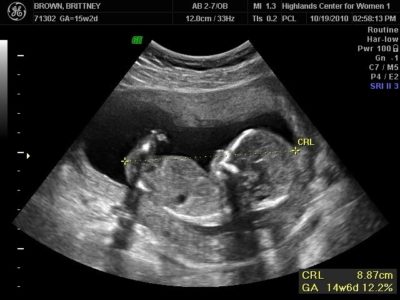
The study shows movement of the limbs. You can see how the baby swallows amniotic fluid and spits it out - these are breathing movements.
The reasons for performing an ultrasound may be abdominal pain, bloody discharge from the vagina.
Screening
Needed to determine congenital malformations. Determining the levels of hCG, AFP, and estriol allows you to assess the risks of having a baby with Down syndrome and underdevelopment of the neural tube.
The results obtained are not final; additional examinations of the amniotic fluid will be required. The analysis is carried out after 15 weeks. The period is considered safe for conducting this study.
Well-being of the expectant mother
At this stage of pregnancy, early toxicosis usually passes. A woman may begin to worry about vasomotor rhinitis or rhinitis during pregnancy. The symptom, like many others at this stage, is caused by an increase in blood volume.
On the digestive side, heartburn and flatulence are possible, but in general the functioning of the gastrointestinal tract is improving.
When sitting for a long time, discomfort occurs in the coccyx. This is how circulatory disorders manifest themselves. You need to get up, walk, stretch.

The appearance of bleeding gums or sensitivity of tooth enamel indicates a lack of calcium, cramps indicate a lack of potassium and calcium.
During this period, the pigmentation of the skin of the face and abdomen changes.
For the first time, you may have difficulty finding a comfortable sleeping position. A special pillow for pregnant women is placed under the tummy.
The expectant mother notes absent-mindedness and forgetfulness. Despite this, she becomes more energetic.
This stage is the time when the first stretch marks appear; it is better to buy a special cream in advance.
Dangers in the 15th week of pregnancy
At this stage, some health problems may arise for the pregnant woman. If you are expecting a boy, there may be a danger for women who observe regular disruptions in the functioning of the kidneys and adrenal glands. The fact is that during the development of a boy, testosterone (a male hormone) is produced, which, if there are problems with a woman’s adrenal glands, can lead to an imbalance, which will adversely affect pregnancy.
However, problems can be avoided by taking a urine test on time to determine the level of 17-ketosteroids.
The 15th week of pregnancy is the most favorable time to conduct an analysis of amniotic fluid in women with genetic diseases and a negative blood group in order to exclude the presence of any pathologies in the development of the fetus.
This week, a pregnant woman may suffer from nasal rhinitis (congestion), and skin pigmentation may increase.
Other weeks:




